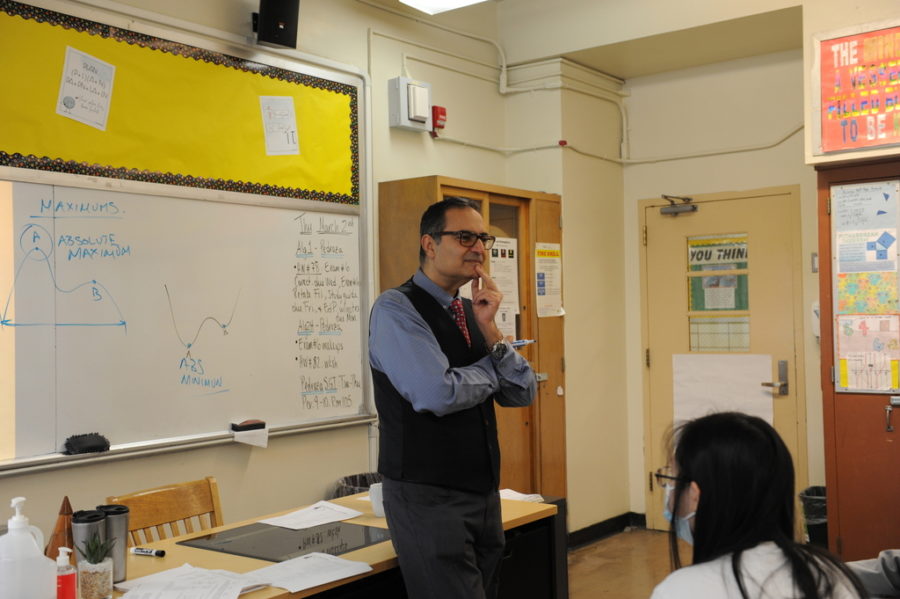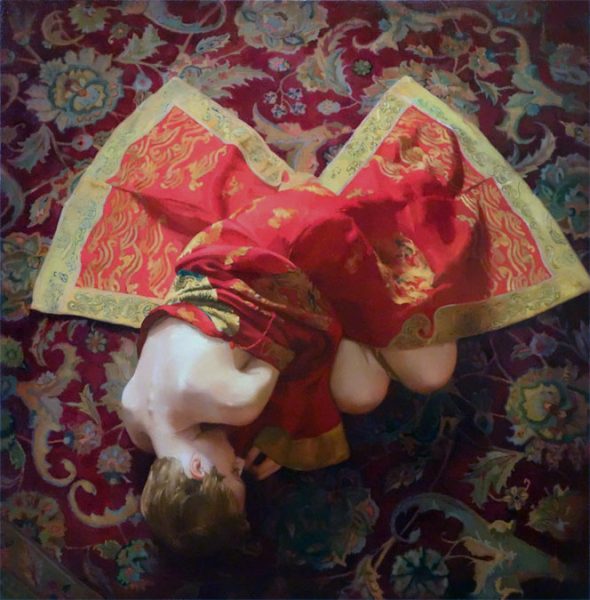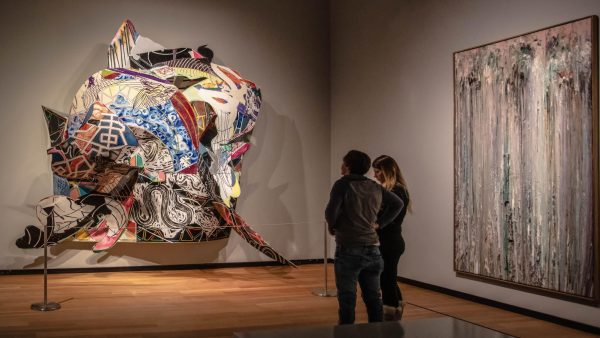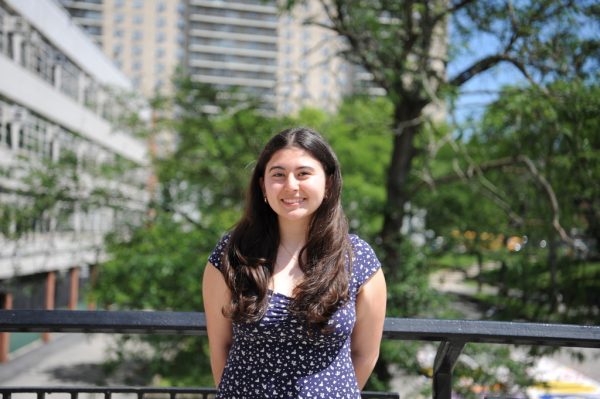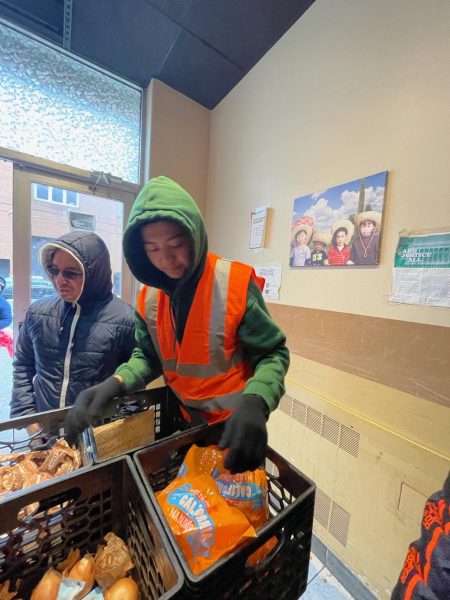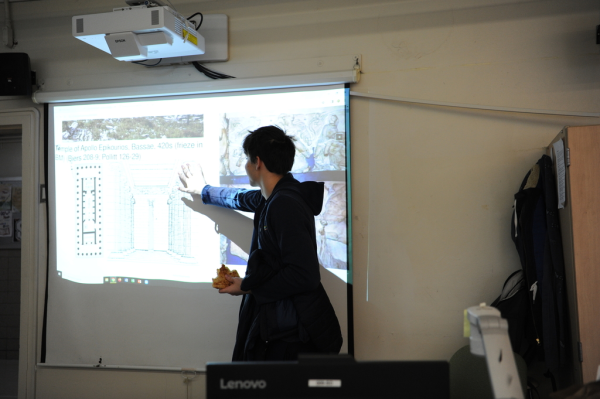Profile on Mr. Arora: Fostering a Growth Mindset
Mr. Arora, the Assistant Principal of the Mathematics department and an Algebra II teacher at Bronx Science, encourages students to break the psychological barrier that keeps them from exploring higher levels of mathematics.
“Mathematics can be a lot of fun if you know what you are doing, so many kids have a mental block either because they were not very well-trained or not being very well-taught. The moment those barriers are removed, they start to enjoy the class,” said Mr. Arora.
It was a Wednesday when Mr. Vikram Arora returned our first test. One by one, he passed out the tests with a smile on his face. Of course, very few of us were smiling by the time we received the graded tests, but Mr. Arora assured us that it would be okay. Most of my classmates panicked, imagining their future plans of attending MIT or Harvard obliterated. Seeing our concerned expressions, Mr. Arora turned to the class and told us the scores were expected and that he was proud of us. The affirmation did little at first; we had heard similar comments from our previous math teachers and were used to the reassurance.
Seeing our nervousness behind our plastered smiles, Mr. Arora decided to engage with us more. “The first thing everyone needs to do to overcome any problem is to acknowledge it, in order to acquire a growth mindset.”
His message instantly clicked in our heads. Mr. Arora’s positive attitude and faith in his students inspire us to learn from our mistakes and grow as mathematicians and as individuals.
Mr. Arora, Bronx Science’s Assistant Principal of Mathematics, discovered his love for mathematics at a very young age. As a kid, Mr. Arora found that in a world full of turmoil, math provided a sense of much-needed stability.
One concept that really interested Mr. Arora was mathematical proofs. He told me in an interview, “If you could prove something mathematically it stands the test of time and criticism. It is true for eternity. This is what spurred me in the direction of higher math.”
Within theoretical mathematics, Mr. Arora recalls he was most captivated by the mathematical induction proof, a method for proving that a statement, P(n), is true. “It’s like the mathematical equivalent of having a telescope,” he told me.
Although Mr. Arora discovered his passion for mathematics early on, he did not realize he wanted to become a teacher until his adult life, when his daughter was born and he wanted to provide her with a sense of stability.
Arora thought, “You know what, I’m not from the United States. I was surrounded by a sense of fear about what my daughter would be exposing herself to in school. Let me try teaching.”
Shortly after, Mr. Arora joined a program, called New York City Teaching Fellows, to help him become a teacher within five weeks. As soon as he became a teacher, he had an epiphany and realized that teaching was his calling. He told me in an interview, “It is a very rewarding experience. A lot of the kids took warmly to me, and it developed from there.”
Mr. Arora began teaching at Bronx Science a few years after he had become a teacher. By this point, he had developed a concrete teaching philosophy that prioritizes a growth mindset. He began to expose the students of Bronx Science to how math can be applied to everyday life, adding relevance. For example, he referenced that Einstein had to learn tensor mathematics in order to write the theory of general relativity. “Once kids can get a handle on math and see the applications in everyday life, it is like Pandora’s box opening up. It’s simple, it is about motivating the kids to break their own physiological barriers,” Arora said to me.
As part of Mr. Arora’s efforts to expose students at Bronx Science to higher levels of math, he invites guest speakers who are active in the field. Mr. Arora told me, “It is extremely important to bring in people who come from outside and can expose the students to either the cutting edge of mathematics or applied sciences.” Bronx Science students often cannot visualize what the math they are learning will do for them in the outside world, and guest speakers put that into perspective.
Mr. Arora continued, “We have had people from IBM and the financial industry come in, and those people were able to expose students to applied mathematics. This gives a lot of creative ideas to children about their own careers and makes them think about what inspires them, interests them, and motivates them.” The use of incorporating people from different fields appeals to different students and inspires them to pursue higher levels of mathematics.
At the beginning of the 2022-2023 year, Mr. Arora took my Algebra Two class to see Po Shen Loh, a mathematical genius from Carnegie Mellon, a top university in STEM education. Mr. Loh spoke to the class regarding how to use game theory to develop real-world applications, which can help in pandemics and help people make better decisions. To Mr. Arora, this level of mathematics was the “gold standard.” It gives a lot of purpose to a lot of kids about the possibilities beyond high school.
What makes Mr. Arora such an amazing teacher is his ability to empower students through his leadership. Mr. Arora expressed to the class, “My teaching philosophy is about having a positive mindset and making sure the kids have the confidence that they can do anything they put their mind to, no matter what your present level is you can always improve. Having a growth mindset should be part of every teacher’s philosophy.” Mr. Arora continued, “When students believe that they can be good at math, they tend to like it more and explore more complex mathematical concepts.”
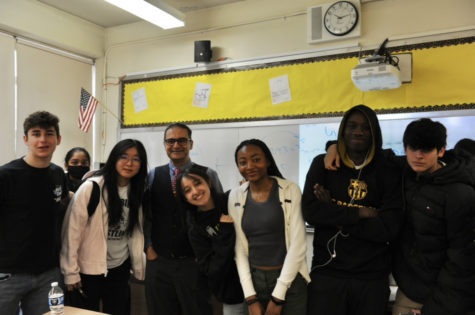
Lack of motivation has never been a problem for the students at Bronx Science. What makes Bronx Science students so special is their curiosity, passion, and eagerness to learn. Bronx Science students have always been serious about their academic achievements. Mr. Arora stated that what makes Bronx Science students so exceptional is their capability. “This removes a lot of barriers in order to accomplish higher level achievements. The sheer possibility of dealing with young, motivated students and seeing what they can achieve is very exciting.”
However, one of the main problems at Bronx Science is self-deprivation of fulfillment. Bronx Science students, because they set such high expectations for themselves, often feel discouraged by a “bad” grade. Mr. Arora knows this, and, because of this, decides to approach teaching complicated math in simple ways.
As the Assistant Principal of Mathematics, Mr. Arora has the responsibility to teach one class in addition to his other duties. Instead of teaching more complex math like calculus or linear algebra, Mr. Arora believes he is most helpful in an Algebra class.
“Algebra Two is the gateway to higher math. We realized this very early, and, because of this, we allocated a lot of resources to Algebra Two. Our algebra Two results are at the highest level they have ever been at. I want to strengthen the basic knowledge in order to make the student’s experiences in the future more enjoyable.”
Mr. Arora understands that strengthening fundamentals is most important to understanding complex mathematical theories. He told me in an interview, “When a student’s base is strong, it is much easier to tackle other mathematical problems confidently.”
In addition to teaching a class, Mr. Arora juggles the responsibilities of being the Assistant Principal of the Mathematics department. This role entails both managing day-to-day activities, as well as creating new elective courses. As A.P., Mr. Arora decided to make multiple direction changes, the first being allocating more resources to Algebra II. Mr. Arora believes that allocating resources to Algebra II would best prepare students to take on more complex math in the future. Additionally, Mr. Arora oversaw the creation of new elective courses. Under Mr. Arora’s leadership, Bronx Science became the first high school in the country to teach algorithms; Bronx Science also created new courses in game theory, financial, and actuarial math.
Through his teaching and responsibilities as an Assistant Principal, Mr. Arora consistently fosters a growth mindset. He told me, “The most important thing is to foster a ‘can do’ mindset. I never am critical of a student, and there is no such thing as a stupid question in my class. Never giving up is crucial. Persistence and tenacity are very important virtues.”
Mr. Arora’s advice to the students at Bronx Science is to “Keep an open mind, have a growth mindset, never think it is beyond you, and seek help.”
“Keep an open mind, have a growth mindset, never think it is beyond you, and seek help,” said Mr. Arora, Assistant Principal of Mathematics.
Isabel Goldfarb is both a Copy Chief and a Social Media Editor for The Science Survey. She tends to focus on A.I., economics, and political science in...

